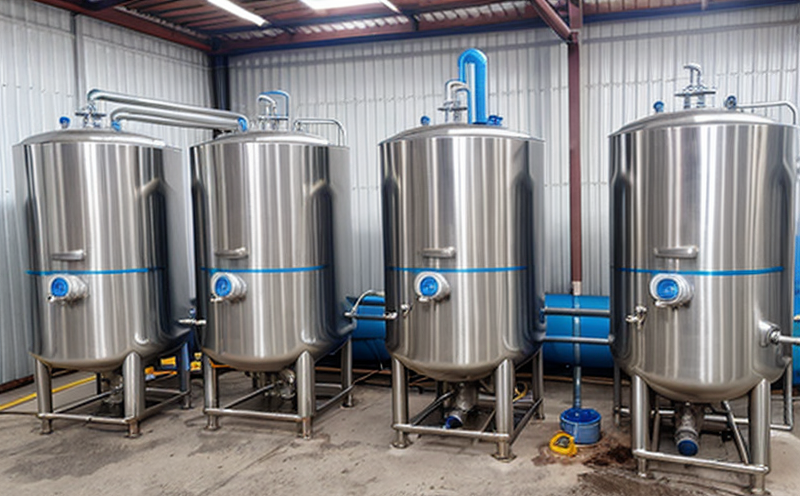ISO 16772 Nickel Test in Boiler Water
The ISO 16772 nickel test in boiler water is a critical process aimed at ensuring the quality and safety of industrial boiler systems. This testing ensures that the levels of nickel within the boiler water are kept well within acceptable limits, which helps prevent corrosion and scaling issues that can lead to costly maintenance downtime or even system failure.
Boiler systems are essential components in various industries such as power generation, petrochemicals, chemical processing, and manufacturing. In these sectors, boiler water is a crucial medium for heat transfer and steam generation. However, the presence of nickel, which can be introduced through various sources like metal corrosion or boiler feedwater treatment, needs to be controlled.
The ISO 16772 standard provides detailed methodologies for determining the concentration of nickel in industrial boiler water. This standard is widely recognized and adopted in industries that use large-scale boilers. By adhering to this standard, businesses can ensure their processes are compliant with international best practices and avoid potential risks associated with excessive nickel levels.
The testing process involves several steps: sampling, sample preparation, analysis using appropriate instrumentation like inductively coupled plasma optical emission spectrometry (ICPOES) or atomic absorption spectroscopy (AAS), and finally, interpreting the results. It's important to note that the correct interpretation of these results is key to maintaining boiler efficiency and extending equipment life.
Sampling should be conducted from various points within the boiler system to ensure a representative sample. Once collected, samples are prepared according to ISO 16772 guidelines before being analyzed using precise analytical techniques. The precision and accuracy of these measurements are paramount since even small variations in nickel concentration can have significant implications for operational efficiency.
The acceptance criteria specified by ISO 16772 dictate the permissible limits of nickel content based on factors such as boiler type, age, and operating parameters. Adhering to these limits helps prevent corrosion-related issues that could lead to reduced heat transfer rates or increased energy consumption. Regular testing ensures ongoing compliance with these standards.
Understanding the role of nickel in boiler systems is crucial for effective management of this critical parameter. Nickel plays a dual role; it can act as both a beneficial element enhancing certain properties of boiler water and a detrimental one when present at levels higher than recommended by ISO 16772. Therefore, regular monitoring using reliable methods like those outlined in this standard becomes essential.
By implementing the ISO 16772 nickel test in boiler water, organizations not only comply with regulatory requirements but also enhance their operational efficiency and safety standards. This proactive approach contributes significantly towards maintaining optimal performance of boilers across all sectors utilizing them.
Applied Standards
| Standard | Description |
|---|---|
| ISO 16772-1:2004 | Method for determination of nickel in boiler water by inductively coupled plasma optical emission spectrometry (ICPOES) |
| ISO 16772-2:2005 | Method for determination of nickel in boiler water by atomic absorption spectroscopy (AAS) |
| ASTM E1349-08(2014) | Standard test method for nickel in water by electrothermal atomic absorption spectrometry (ET-AAS) |
Eurolab Advantages
At Eurolab, we pride ourselves on providing comprehensive and accurate ISO 16772 nickel tests for boiler water. Our state-of-the-art laboratories equipped with advanced instrumentation ensure precise measurements that comply strictly with international standards.
- We offer quick turnaround times without compromising the quality of our results.
- Our team of experienced chemists ensures thorough and reliable analysis, providing insights beyond mere compliance checks.
- Comprehensive reports tailored to meet specific client needs including detailed recommendations for corrective actions if necessary.
- Supporting documentation such as certificates of analysis (COA) are provided promptly after testing completion.
We understand that accurate and timely data is vital in maintaining the integrity of industrial processes. At Eurolab, we strive to deliver exactly what our clients need when they need it most.
Competitive Advantage and Market Impact
- Our expertise in ISO 16772 testing sets us apart from competitors offering less specialized services.
- The reliability of our results fosters trust among clients, enhancing their reputation within the industry.
- We provide detailed analysis that helps prevent costly downtime by identifying potential issues early on.
- Our adherence to international standards ensures consistency across projects and locations worldwide.
EuroLab’s commitment to excellence in ISO 16772 nickel tests contributes positively towards improving overall market standards. By offering superior quality services, we help our clients stay ahead of competitors by maintaining high levels of operational efficiency and safety.





